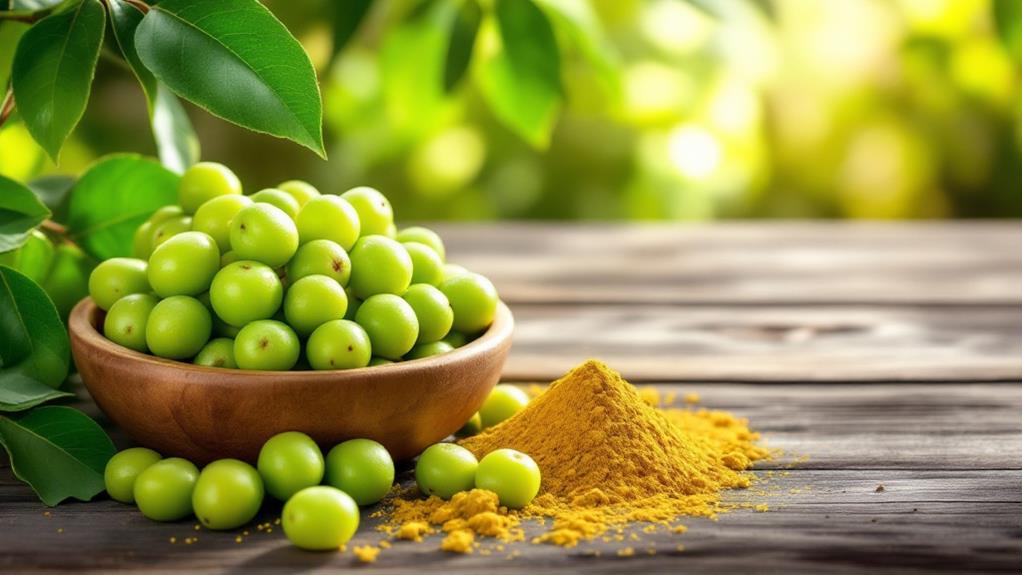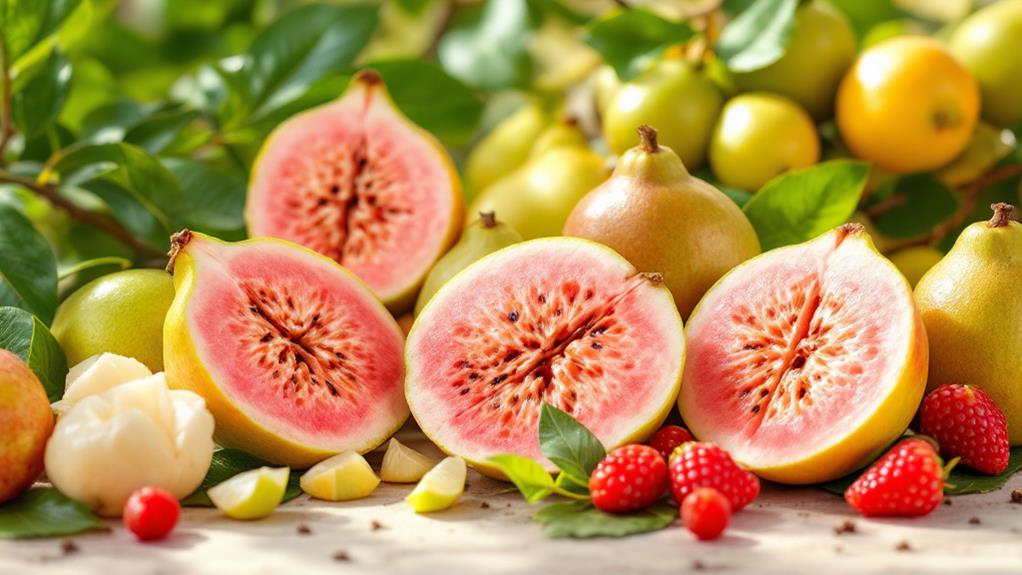The Many Uses of Amla (Indian Gooseberry): A Nutrient Powerhouse

You'll uncover amla, or Indian gooseberry, as a nutrient powerhouse brimming with vitamin C, polyphenols, and antioxidants. It fights off oxidative stress and inflammation while providing crucial minerals like calcium and iron. Amla's high fiber content aids digestion and supports heart health by managing cholesterol levels and blood pressure. For skin and hair, its antioxidant properties promote collagen production and strengthen hair follicles. In the kitchen, amla adds a tart twist to salads, chutneys, and smoothies. Consuming amla regularly can dramatically improve your overall well-being and vitality. Perhaps you might investigate even more remarkable benefits it offers.
Nutritional Benefits of Amla
While you might be familiar with the health benefits of fruits like oranges, amla, or Indian gooseberry, takes it a step further with its impressive nutritional profile. Amla contains a whopping 720 mg of vitamin C per ¼ cup serving, far surpassing the vitamin C content of typical citrus fruits. This high concentration of vitamin C is vital in supporting immune function and promoting skin health, which could potentially help reduce aging signs.
In addition to vitamin C, amla is rich in polyphenols, which, alongside antioxidants, help combat oxidative stress and inflammation. These compounds are essential for maintaining comprehensive health and preventing chronic diseases. Despite its powerful nutrient content, amla is surprisingly low in calories, making it a fantastic enhancement to your diet if you're watching your weight.
Furthermore, amla is high in dietary fiber, which supports digestive health and helps you feel fuller longer. This can contribute to better satiety and improved gut health. Amla also provides important minerals like calcium and iron, which support bone health and blood formation. Incorporating amla into your diet offers a multitude of health benefits, making it a valuable enhancement to any healthy lifestyle.
Antioxidant Properties
Amla stands out among fruits with its impressive antioxidant properties, thanks in part to its high vitamin C content, ranging from 193 to 720 mg per 100 g. This makes it exceptionally effective at combating oxidative stress. When you consume amla, you're not just getting vitamin C; you're also benefiting from polyphenols and flavonoids. These compounds work together to neutralize free radicals, reduce inflammation, and deliver numerous health benefits.
Here's why incorporating amla into your diet can be beneficial:
- Chronic Disease Prevention: Amla's antioxidants can reduce oxidative damage, potentially lowering your risk for chronic diseases like cancer, diabetes, and cardiovascular conditions.
- Neurological Protection: Regular consumption of amla may improve cognitive function. Its antioxidants support neurological protection, which could reduce the risk of neurodegenerative diseases.
- Enhanced Health Benefits: The presence of anthocyanins and phenolic acids in amla further bolsters its ability to prevent oxidative stress-related damage, making it an invaluable component of a health-conscious diet.
Amla for Heart Health

Improving heart health, amla offers a multitude of cardiovascular benefits. Packed with vitamin C, it plays an important role in improving endothelial function and reducing oxidative stress. This reduction can lead to lower cholesterol levels, which are vital for maintaining heart health. Studies have shown that consuming 500 mg of amla daily can greatly reduce total cholesterol and triglyceride levels, making it a valuable ally in your cardiovascular wellness plan.
Incorporating amla into your diet can also help regulate blood pressure, thanks to its rich potassium content. Potassium is known for its ability to relax blood vessels, thereby supporting healthier blood pressure levels. The high fiber content in amla further improves cardiovascular health by reducing the risk of heart disease through its anti-inflammatory effects. Fiber helps maintain a healthy balance in your system, promoting general heart health.
Regular consumption of amla can improve your blood circulation, reducing cardiovascular risks and ensuring your heart functions effectively. By adding this nutrient powerhouse to your daily routine, you're actively taking steps to elevate your heart health and safeguard against potential issues. With amla, you're nurturing your heart and supporting a healthier, more lively life.
Skin and Hair Advantages
Beyond its impressive cardiovascular benefits, you'll find amla to be a powerhouse for skin and hair health too. Rich in vitamin C, amla improves collagen production, which is key for maintaining skin elasticity. This means fewer wrinkles and fine lines, helping your skin look youthful and radiant. The antimicrobial properties of amla also work wonders by preventing acne and skin infections, giving you a clearer complexion.
Here's how amla can transform your skin and hair:
- Increases Skin Elasticity: The high vitamin C content in amla promotes collagen production, enhancing skin elasticity and reducing signs of aging.
- Improves Hair Health: Amla's antioxidants protect hair follicles from damage, helping prevent premature graying and increasing total hair health.
- Enhances Scalp Health: It nourishes the scalp, reducing inflammation and creating a balanced environment for hair growth.
Amla doesn't just stop at your skin; it's a nutrient powerhouse for your hair too. With vitamins A and E, it supports hair growth and strength, making it a favorite in hair care products. Regularly incorporating amla into your routine can lead to healthier skin and thicker, stronger hair.
Culinary Uses of Amla

In regards to culinary uses, amla offers a delightful burst of flavor and nutrition. This tart fruit is a staple in traditional Indian cuisine, bringing a unique taste and high vitamin C content to the table. You can enjoy it raw to add a zing to salads or pair it with sweeter fruits for balance. Amla chutney is a popular dish where the fruit is combined with spices and herbs, creating a flavorful condiment that complements many meals.
If you're looking for a revitalizing beverage, amla juice is a fantastic choice. Its high vitamin C content makes it a healthy option, and you can dilute it with water or mix it with honey for a touch of sweetness. For a tangy side dish, try pickling amla, much like cucumbers, to improve your meals.
Amla's versatility doesn't stop there. Amla powder is a great supplement to smoothies, yogurts, and health bars, elevating their nutritional value with ease. Regardless of you're incorporating it into your meals or enjoying it on its own, amla offers a variety of culinary uses that are both delicious and nutritious.




